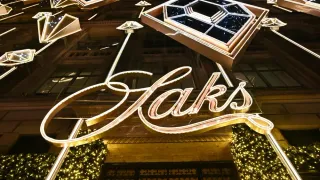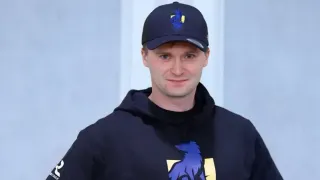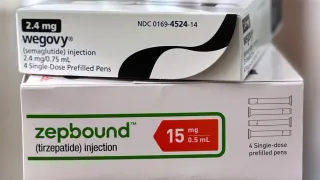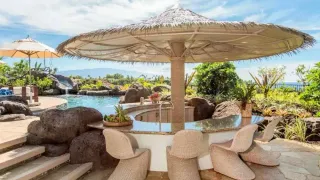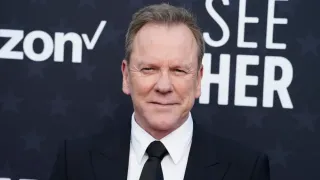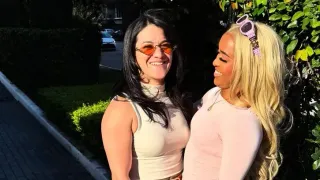August 29, 2021
Romanovsky and Phillips: Gay Music Duo's Fascinating, Groundbreaking History
Michael Flanagan READ TIME: 14 MIN.
Incredible as it seems, it has now been more than 20 years since Romanovsky and Phillips called it quits. Part of the reason it seems so amazing is that accolades continue to pour in about them all these years later.
A biography of the duo on Allmusic.com calls them "easily the most popular out-of-the-closet singing duo in history" and refers to them as "the most successful gay group in the history of the community." Whether or not you rank them that way on your own personal list of gay musicians, it's obvious that they made a huge impact.
It wasn't always clear that that would be the case. I should note that I've known them both a long time. I met Paul Phillips more than 40 years ago, before there was a Romanovsky and Phillips, when he was assistant manager at B. Dalton Bookseller in Embarcadero Two.
In November 1980, less than two weeks after moving to the Bay Area, I took a job there and we worked together for nearly three years. I was there when Paul came floating into the bookstore after meeting a cute and talented musician at a bus stop in Golden Gate Park in the summer of 1981, and shortly thereafter I met Ron.
From the very start they were busy, in 1982 and 1983 at venues in San Francisco like The Valencia Rose (766 Valencia St.) and the Baybrick/Clementina's (1190 Folsom) in San Francisco and down the peninsula at places like the Stanford Coffee House. They were also featured on KGO by David Lamble on "Fruit Punch" and in print with reviews of their shows in the Bay Area Reporter. So it's important to recognize that they worked very hard to make their career a success from the beginning.
The chances they took are inspirational. Paul quit the bookstore and joined Ron as full-time musicians. They took a gamble and toured the country. They would go on to record six albums, tour the U.S., Canada, and Australia, and perform at two different Marches on Washington and numerous Pride events throughout the country.
That they were able to do all of this before the internet (or even email) on an independent label is amazing. Of course, luck had something to do with their success, but so did a good deal of persistence, research, and networking. And that is the other genius of Romanovsky and Phillips.
In our expansive interview, it was enjoyable to listen to them complete each other's thoughts and give each other space to complete their own thoughts. It's a testament to their 40-plus years as friends and their working relationship.
Michael Flanagan: Your first international tour was 1983, and you went to Bangor Maine, Champaign Illinois, Minneapolis and Portland for the first record. Was it a revelation to you as to how you were received on college campuses?
Romanovsky: I guess it was a bit of a revelation – I suppose it was probably the thing that kept us going, because we had so many problems on that tour. We had tons of car problems, our van broke down, and we had some health issues along the way. There was a lot of down time. It was about 18 cities in four months. The response kept us going. You could tell that people were really happy to hear music that spoke to their experience, to the gay experience.
Phillips: On that first tour I'm not sure that we performed all that many college campuses – we did a couple, but I'm not sure they were produced yet by gay and lesbian organizations.
Romanovsky: I know we played in Steven's Point Wisconsin at the University and Champaign Urbana. I think it was gay groups that invited us.
Phillips: But as our career progressed, college campuses became a huge market for us in terms of either producing us on campuses or gay groups producing us, and eventually (in 1993) we played at the National Association for Campus Activities conference, and from there we started being produced more often by the student association as opposed to the gay groups or the women's groups. We were incredibly well received (at the NACA), we got a huge standing ovation, and we were the first openly gay act to play on the main stage there. This was at the Opryland Hotel, not to be confused with the Grand Old Opry.
You really struck at the right moment, compared with someone like Stephen Grossman, who earlier on really got the shaft.
Phillips: We always believed that it was a pretty tragic thing that he never got the kind of acclaim that he should have, because "Caravan Tonight" is one of the most amazing albums. Not only did we hit at the right moment in time, but we were also welcomed by the women's community – and part of that is because we knocked on those doors a lot. But a lot of our concerts in some states were regularly produced by women's production companies, and it was us who got Ladyslipper Music to start carrying men's albums.
Ron and I both cared a lot about that. A lot of times we would have lesbian comics or lesbian singers open for us, and I think we were part of a project of building bridges that hadn't occurred prior to us.
Would you mind talking a little bit about the Valencia Rose and how important it was in your career?
Romanovsky: I was already starting to write gay songs when I met Paul, and I wanted to perform, but the problem was there wasn't a venue that I felt comfortable doing that in. I didn't want to just perform in a bar. I think I performed at Fanny's (4230 18th Street) a couple of times. That was kind of okay, but it really wasn't quite my speed.
And then I heard about the Valencia Rose, and that it was going to open, and that it was going to be a dedicated performance space or cabaret type venue for gay and lesbian artists. As soon as I heard it was open, I called them up and we got invited to perform at gay comedy (night) just by going down and auditioning for one of the owners. So it made all the difference in the world to have a venue that I felt comfortable in, where people were coming to hear gay entertainment.
Phillips: It really was responsible for molding us and forming us as performers.
Romanovsky: Yeah, we never intended to do a lot of comedy, but we sort of had to fit in. Ron Lanza, the owner, had an intuition that if we were just thrown into the mix with the other comedians we'd find our comedy legs. Around that time, as I said, I wasn't comfortable performing in any of the other venues that gay men frequented, because there were just a lot of gay men getting up and singing show tunes and not even changing the pronouns when they would sing a love song.
And you performed at Clementina's/Baybrick Inn?
Phillips: After Valencia Rose opened, Lea DeLaria decided to have a gay and lesbian open mic night, and she had us play there a couple of different times at least.
As independent musicians you had trouble with Master Track in Hayward, when they refused to record your cassettes. I know you worked with Teresa Trull (she produced the duo's album "Trouble In Paradise," as well as Romanovsky's first solo album). Were there people you could ask for advice or were you making it up as you went along?
Romanovsky: There were people we could ask advice of. Charlie Murphy put out an album called "Catch The Fire" in 1981, and I met him. It was right before Paul and I started performing. When I was ready to tour, I called up his people. He gave me a whole bunch of contacts all over the country, people to call and to get them to try and produce us.
As we started to get to know some of the women in the women's music scene, we got advice from them, too. The other resource we depended on a lot was a publication called The Gayellow Pages, which oddly was green. Every city had community organizations, bars, all kinds of different gay places.
Phillips: At one point we were even using the listings in the Bob Damron's guide (Bob Damron's Address Book). If there was a city that came up that we thought, "Well, we've never been there, we want to go there." If "The Gayellow Pages" didn't produce any groups we would go to the Damron's guide and look and see if they had any bars or clubs or organizations listed.
Probably the thing we owe the most to is a book called "How to Make and Sell Your Own Records" (Diane Sward Rapaport, 1979). We read that thing from start to finish and referred to it regularly. When we made our first album we didn't know two-inch tape. We had never done any kind of recording aside of recording on cassettes, and that album was totally made wrong. We didn't know what we were doing, but we had this determination. In hindsight, it was mostly just being pig-headed and working our ass off.
In that book, it said, "Start a mailing list." So, at every single concert we did, we talked about the mailing list and it was out at our table at the entrance. By the time our career ended in 1999, our snail mail list was somewhere between 12,000 and 14,000 names.
Romanovsky: It's funny, because it's the kind of thing that mainstream businesses do now. They're always trying to get your email address every time you buy something online or in a store; direct marketing. But they didn't do that back then. I'm not saying we invented it. We were in the right place at the right time, because the Bay Area was so gay, and because there were a lot of people making independent records. Not just the Women's music labels, Olivia and Redwood. Lots of people were doing it. I don't think we could have done what we did anywhere else.
Phillips: The other thing I just real quick wanted to mention is Master Track (the company that refused to duplicate their cassettes). Throughout our career we ran into homophobia like that.
Romanovsky: It happened on the "Brave Boys" album with the printing. A couple of companies saw the song titles and refused it.
Phillips: "Brave Boys" was our last album, and that album was delayed. Even with our songbook, it happened. Printers would accept the work or color separators would accept the work, and they would put it in the rotation, and three weeks would go by and when it came into the rotation of their projects they would decide, "Oh no, we're not going to do this."
Romanovsky: And you've lost a month, you've got a tour starting the next week. It really can fuck you up.
Phillips: We just kept running into that; four or five times at least we had that happen. And one of the biggest traumatic things that happened to us was that we had a 12,000-piece mailing going out – first class mail post cards – announcing our album and announcing that we were going on tour for it. So we hired a mail center to put the stamps on and delivered it to them and left on tour the day we delivered it to them. Those postcards never were received.
The Federal Marshals got involved. The company said they dropped them off at the back of the post office, and the post office claimed they never got them. There were numerous interviews by Federal Marshals and it ended up coming to nothing, but we lost so much money.
What about radio? I know that you were on "Fruit Punch" a couple of times. Was there a radio network that you were plugged into?
Phillips: There were a number of gay shows around the country, mostly on public radio stations or college radio stations, and, again, we would scour resources. Anytime we went to a town we would grab their newspapers, their newsletters, whatever, and constantly glean those as well. But as our career built, then those people started coming to us.
But the reality was that nobody had ever made or produced gay music that had gotten a whole lot of attention, media-wise. The reality is, we didn't have access to mainstream media at all. So we depended almost entirely at first on all of those sort of alternative media sources. KPFA had a sister in Texas called KPFT and, you know, J.D. Doyle, of course, and Buddy Johnston. They both had gay radio shows in Texas and they would play our stuff a lot, and Julie Nicolay in Connecticut. There was a lot of Women's programming.
I have to say that Women's Music and Women's Programming was way far advanced from where any gay guys had gotten. There were already women's shows – KUNM, the university station down in Albuquerque – we got on there pretty early on, too. And it was more often because there were lesbian programmers or disc jockeys.
One of the largest media audiences that we were able to access was on NPR. We were interviewed on "Weekend Edition."
How did you wind up performing at Great American Music Hall?
Romanovsky: It took a long time. I mean, I say that now, but in retrospect it seems like everything happened very quickly. But at the time, we just kept knocking on their door.
You sold it out several times.
Romanovsky: Yeah, we blew them away. It's one thing I don't mind bragging about. They really didn't have any faith in us, and I think they finally booked us on a Tuesday night. It was in July 1986 (July 15) after "Trouble In Paradise" came out.
That was our second record. We had been trying for a year and a half to get booked there, and they said, "Oh, you'll never sell the place. It will never work," and we just kept bugging them.
I think the fact that Teresa produced that album helped give us some more cred, because at that time Holly Near and Chris Williamson were all playing there. They finally did it, and we sold it out. It was incredible. We played there maybe four or five more times and the last time it was starting to dwindle, but we had several packed shows there.
(As we were ending the interview Ron told another story which he found amusing. It's also interesting as it is from a period where LGBTQ music and artists and their audiences were once again in a state of flux.)
Romanovsky: At one point, maybe in 1997, I was in the process of booking us at the Arc (316 S Main St, Ann Arbor, MI) and David Siglin (the co-owner) said, "Would it be okay if we had this guy Rufus Wainwright, open for you?"
It didn't actually happen, but it almost happened. I knew he was Loudon Wainwright's son. I mean now, of course, I'm a huge fan. I just found that really amusing, because, at the time, he just had one record out and he was trying to develop a following, so they thought, "He's gay, so have him open for Romanovsky and Phillips."
In the mid-1980s, Paul and Ron moved to Santa Fe, where they continue to live today. Paul has retired from the music industry, but Ron is still an active local musician in New Mexico, and has continued to release music and play with other musicians.
The legacy of Romanovsky and Phillips lives on in works like Dirk Alphin's documentary "Stand Up, Stand Out," a film on gay comedy at the Valencia Rose (Alphin was the Rose's operations manager) as well as their music.
The story of how two young San Franciscans met, started their own label, and made music for nearly two decades is more, however. It's a testament to what persistence and bridge-building between communities – and fighting back against prejudice and homophobia – can accomplish. There continues to be much we can learn from their lesson.
J.D. Doyle's Queer Music Heritage page on Romanovsky and Phillips: /www.queermusicheritage.com/r&p
Dirk Alphin's Stand Up, Stand Out film page: standupstandoutfilm.com
See previous years' coverage of Romanovsky and Phillips in vintage B.A.R.'s at https://archive.org/details/bayareareporter, including March 16, 1989's "Breaking Up is Hard to Do".
Help keep the Bay Area Reporter going in these tough times. To support local, independent, LGBTQ journalism, consider becoming a BAR member.
